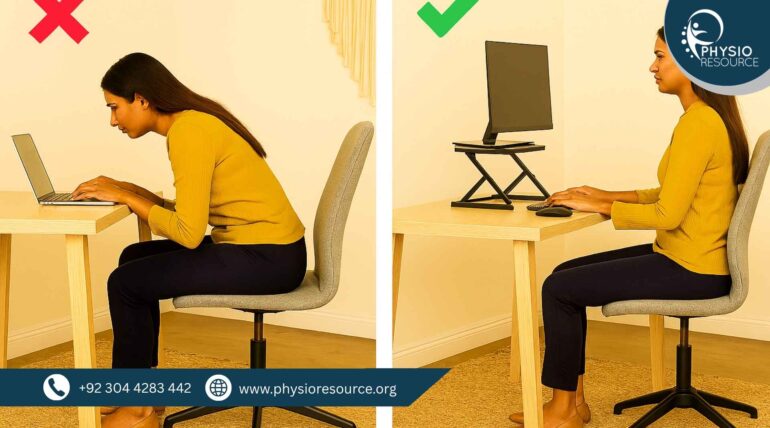
The trends of working at home or in a hybrid setup can be very attractive, but one thing that goes unnoticed is that it has increased the spine-related issues silently. A person who sits for 6-8 hours every day in a non-ergonomic setup will suffer from neck stiffness, lower back pain, tension in the shoulder, and even disc problems at the same time. Poor chair height, low-positioned laptop screens, lack of lumbar support, and bad foot positioning are the factors that slowly but surely create muscle tightness, nerve compression, headaches, and misalignment.
However, the good news is that if you have a proper home office setup and physiotherapy-informed adjustments, you can eliminate the risk of these issues, reduce your risk of chronic pain, and even save on future physiotherapy costs. A spine-friendly home office is not just a comfort — it’s a safeguard for your spinal health in the long run.
Step by Step Spine-friendly Home Office Setup
Step 1: Laptop Screen at Eye Level
Your laptop or monitor should be at eye level. This maintains the neck in a neutral position, preventing forward head posture that is a cause of cervical muscles strain. Use a laptop stand or external monitor to keep your alignment right.
Tip: If the screen is low → neck bending causes strain in cervical muscles.
Step 2: Support Your Lower Back
Place a lumbar cushion or a rolled towel to hold the natural curvature of your lumbar spine. Good lumbar support will lower the pressure on discs and at the same time prevent the development of lower back pain.
Step 3: Elbow Angle 90 Degrees
Keyboard & mouse should be at elbow height.
If elbow is down, then upper traps tighten and you get shoulder pain.
Step 4: Feet Always Flat on Floor
If your chair is too tall use a footrest.
Hanging feet = pressure on lower back increases.
Step 5:30-Min Mobility Rule
After every 30 minutes → stand and stretch for 60 seconds.
Studies have shown that taking breaks for movement can help to reduce the amount of energy stored in spinal discs.
Related topic: Best Poor Posture Treatment in Lahore
Top Physiotherapy Approved Exercises for Home-Office Users
• Chin tuck (30 seconds)
• Chest opening stretch
• Cat camel for spine mobility
• Thoracic extension against chair
| Exercise | Helps With |
| Thoracic Extension Over Chair | Upper back stiffness |
| Upper Traps Stretch | Neck pain |
| Doorway Chest Stretch | Rounded shoulders posture |
| Seated Hip Flexor Stretch | Lower back load reduction |
| Standing Spine Rotation | Mid spine mobility |
| Ankle Pumps | Circulation improvement |
| McKenzie Back Extensions | Disc pressure relief |
Routine: every 20–30 minutes → 1 mobility movement.
End of day → thoracic extension + McKenzie extensions = BEST prevention combo.
These are the same exercises approved by advanced therapists around the world.
Why Posture Matters More for Home Workers?
Because no one is watching your position.
The ergonomics of an office chair are a shared responsibility between the office and at home you are the one responsible.
Where to Get Professional Posture Correction in Lahore
At Physio Resource, regarded as the best physiotherapy clinic in Gulberg Lahore. we offer personalized ergonomic analysis, posture assessment, desk setup guidance, and spinal strengthening plans for home workers. Dr. Ahmad Bilal — the best physiotherapist in Lahore for posture & spine problems, who treats the root cause, not just the pain.
Book Your Consultation
Protect your spine today. Not after the pain becomes severe. Get the same day appointment in Lahore.
If you want a pain-free work-from-home lifestyle → professional spine care is going to be your future investment.
Physio Resource
Phone No: 0304-4283442
Address: 93-A1, Gurumangat Road, Gullberg, III Lahore
Meet the Author: Dr Ahmad Bilal
A knowledgeable Consultant Physiotherapist, Spine Specialist, Posture Expert & Movement Scientist. Famous for his unconventional treatment, precise diagnosis and modern physiotherapy techniques. He is the one who is considered as the most competent physiotherapist in Lahore, besides being the ergonomic specialist for office and chronic spine pain rehabilitation as wel
Written by: Dr. Ahmad Bilal (Consultant Physiotherapist – MS NMPT, Spine & Posture Specialist)


